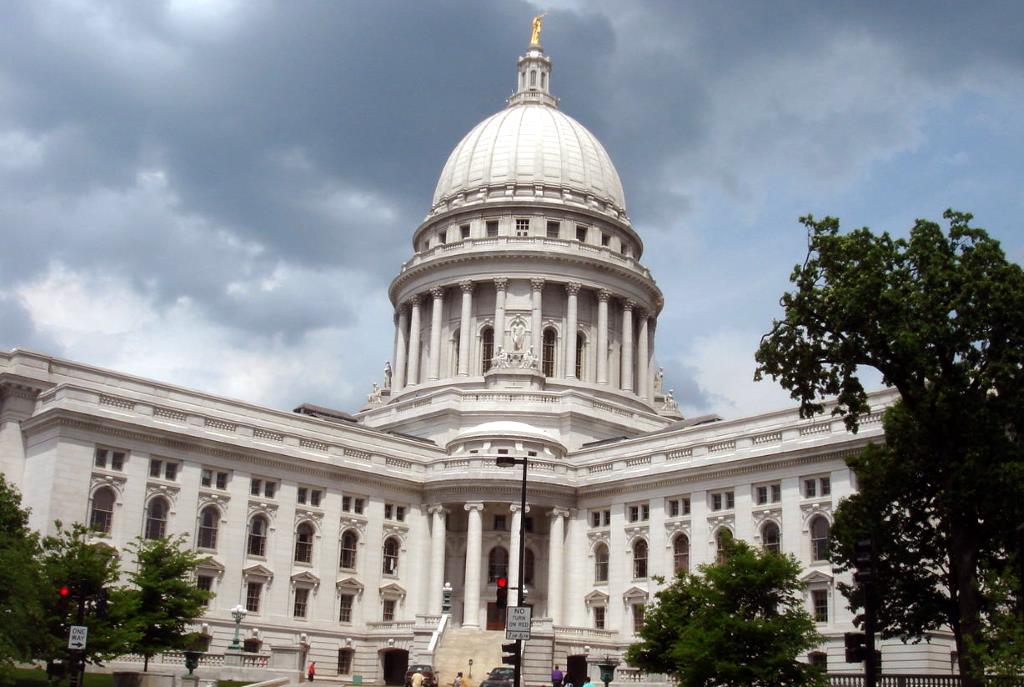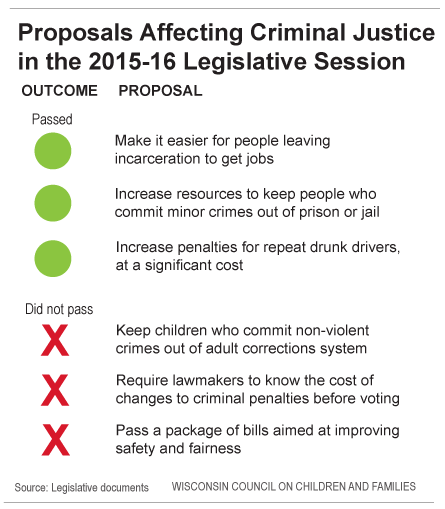Legislators Made Criminal Justice Reforms
They “banned the box” for employees, increased alternatives to prison, upped penalties for drunk driving.
This month, Wisconsin state lawmakers wrapped up the legislative session that began in January 2015. In this session, they passed several bills that affect public safety and the state’s corrections system. They also missed several opportunities to make major improvements to the corrections system.
The legislature is scheduled to be out of session for the rest of the year. Occasionally lawmakers call for a special session of the legislature that is not on the regular schedule, but assuming they do not do that, they will next meet in January 2017. Bills that did not pass during this session can be brought up again at that time, but will have to start the process over.
Removing a barrier to employment
Getting a job can help individuals leaving incarceration avoid future involvement in the criminal justice system. But some employers ask about previous convictions early in the application process, and immediately disqualify anyone who checks the box indicating they have ever been incarcerated. That practice makes it harder for people leaving prison or jail to become contributing members of their community.
Early this year, lawmakers removed a barrier to employment for people leaving incarceration by “banning the box” for most state jobs. That means that lawmakers required the state to wait until the end of the application process to ask about a candidate’s past involvement in the criminal justice system, giving potential employees an opportunity to be first evaluated on their merits.
Lawmakers’ move to ban the box for most state jobs was part of a larger package that made significant changes to the state’s civil service system. (2015 Wisconsin Act 150)
Keeping people out of prison and in treatment
Lawmakers expanded a program that keeps offenders who commit minor crimes out of prison or jail, instead treating their mental health and addiction problems.
Wisconsin’s Treatment Alternative and Diversion (TAD) program awards state grants to counties for programs that keep people with addiction and mental health issues out of jail and prison, and in effective treatment programs. Wisconsin’s TAD program has grown in recent years and has served as a model for other states seeking to reduce incarceration and corrections costs, but only about half of Wisconsin counties currently get grants from the state to support these alternatives.
Legislators approved spending an additional $2 million on treatment and diversion in each of the next two years. Each dollar the state invests in the TAD program saves $1.96 in public costs by reducing incarceration and lowering the risk that offenders will commit new crimes, according to a research study. Not all those savings accrue to the state budget, but it’s clear that expanding the TAD program is a smart investment that will pay dividends over time for Wisconsin’s communities, families, and the state. (Assembly Bill 657)
Increasing penalties for repeat drunk driving
Lawmakers increased penalties for people who have been convicted of drunk driving four or more times. Only four states have higher rates of drunk driving than Wisconsin, according to a survey from the Centers for Disease Control and Prevention that asked residents if they had recently driven after drinking too much.
The higher penalties for drunk driving come with a very substantial cost. The change is expected to increase the number of people in the state prison system, thereby costing the state an additional $98 million to $129 million per year. In addition to that amount, the state may need to build additional facilities to provide alcohol treatment to the offenders, with construction costs adding a one-time cost of $157 million to the total cost of the bill. (AB 536/Senate Bill 455)
Missed opportunities to improve public safety
The legislature did not approve several changes that would have enhanced the safety of Wisconsin’s communities and improved the state’s corrections system, including:
- Keeping children who commit non-violent crimes out of the adult correctional system. Wisconsin is one of only a few states that treats 17-year olds as adults in the corrections system, meaning that students still in high school can be put in prison with adults. The Second Chance bill would have allowed 17-year olds who commit non-violent crimes and who have not previously committed crimes to be treated as juveniles in the correction system. The bill had broad bipartisan support. (AB 378/SB 280)
- Ending the exemption that forces lawmakers to vote on changes to criminal penalties without knowing the cost. Before lawmakers vote on legislation, state officials are required to prepare an estimate of how much the bill will cost in public money. However, legislative rules make an exception for bills that include changes in criminal penalties. On these bills lawmakers must vote in the dark, without any estimates on how future costs will be affected by their decisions. Lawmakers did not pass a resolution that would have ended that exemption. (Assembly Joint Resolution 101/SJR 85)
- Reforming the state’s criminal justice system. Representative Evan Goyke circulated a package of bills aimed at making communities safer while creating a more efficient and effective criminal justice system. The bills would change how the state treats people in the criminal justice system before and after conviction and would also make structural changes to Wisconsin’s criminal justice system. The package was not introduced until the very end of the session but could serve as a starting point for criminal justice reform in the next legislative session.
Wisconsin Budget
-
Charting The Racial Disparities In State’s Prisons
 Nov 28th, 2021 by Tamarine Cornelius
Nov 28th, 2021 by Tamarine Cornelius
-
State’s $1 Billion Tax Cut Leaves Out 49% of Taxpayers
 Sep 21st, 2021 by Tamarine Cornelius
Sep 21st, 2021 by Tamarine Cornelius
-
TANF Program Serves a Fraction of Poor Families
 Aug 30th, 2021 by Jon Peacock
Aug 30th, 2021 by Jon Peacock
























Increasing penalties for drunk driving should NOT require additional prisons! There are almost 3,000 people in state prisons who were charged before the 2000 “Truth in Sentencing” legislation, which was championed by Walker when he was a legislator. TIS got rid of parole and now most of those people prosecuted before 2000 have been eligible for parole, some for YEARS, but are not being considered, even if they are doing well enough to be working outside of the prison on work-release unsupervised! The parole system is broken and there is no motivation to fix it for the remaining prisoners s who are eligible. This is one thing that could be done to reduce our prison population.
Another even bigger one is that the largest number of people who go into prison in WI each year are people who break a rule of their probation but do not commit another crime. Their probation is revoked and they go back to prison. So, for example, most have a curfew of 7:00 or so. If they are late and fail to contact their PO the PO can very arbitrarily send them back to prison. Their are more than 4,000 per year going back for parole violations. Many states have banned this practice of sending people back to prison if they haven’t committed a new crime. There are other more effective and less costly community-based sanctions that can be imposed. If WI banned this practice, with the exception of a few, depending on the nature of the original crime andthe parole violation, huge money would be saved and dangerous overcrowding would be solved.
There is absolutely no need to build additional prisons in WI. We need to fix the criminal justice system here so we better match the sanction to the crime and focus on rehabilitation so those returning (that is almost everyone) can be productive and our communities safer because of it.
You said, “Getting a job can help individuals leaving incarceration avoid future involvement in the criminal justice system.”
I say, “Getting people into jobs helps them to avoid committing crimes to begin with and keeps them out of prison.”
Idle hands are the Devil’s workshop.
I can’t believe we are still sending so many to prison for Non-violent Crimes. This is Draconian. We live in the Dark Ages in Wisconsin as well as the rest of America. I am so ashamed of what we have become. There is a Higher Law., an Enlightened Way of Love. What kind of monsters are we in this Country. We arrogantly blame the victims and hold our prideful noses in the air until one of our own, in a Manic, Bipolar State, drinks, drives, and then we want it all to be different somehow. When will we stand up and demand that Walker provide genuine meaningful Wisconsin State Prison Reform. I can’t believe he would be so witless as to think that upping penalties for the very sick who drink and drive multiple times, is somehow a brilliant use of Taxpayer Monies. Over and over, researchers have shown that punishing the sick is not going to achieve the desired results. Intelligent people know this. Walker has been avoiding real reform for years and if you don’t believe this, check out,”Wisconsin Prison Reform” on the Internet. Note that most entries are from 2014-2015. As a Taxpayer, I’d like to see him free the Non-violent offenders, especially Drug and Alcohol related cases, and use that money to improve the lives of our Wisconsin Children, Mentally Ill and the Disabled.
Truth in sentencing should be repealed in Wisconsin as being overly punitive and grossly outdated. There are many inmates in our prisons serving lengthy terms for non-violent crimes who have never hurt anyone and who are not a danger to the public. This includes those who downloaded free Internet child pornography. Actually, the drug dealers who have been released lately by Obama are a far more dangerous threat to our children than people who “looked but didn’t touch”. This is a morale issue to be judged by God and not by the state. Witch hunts didn’t work before as proven by history. Those who are also against stiffer penalties against repeat DUI offenders should look at the penalties for involuntary manslaughter vs those who only looked at pictures. The tolerance and acceptance of Wisconsin for alcohol use is misplaced in direct correlation to punishments for low level non-dangerous offenders. Don’t get me wrong. I am against those offenders who have caused bodily harm to children but too many good people have been wrongly included under that umbrella of shame and have been unfairly marked for life.